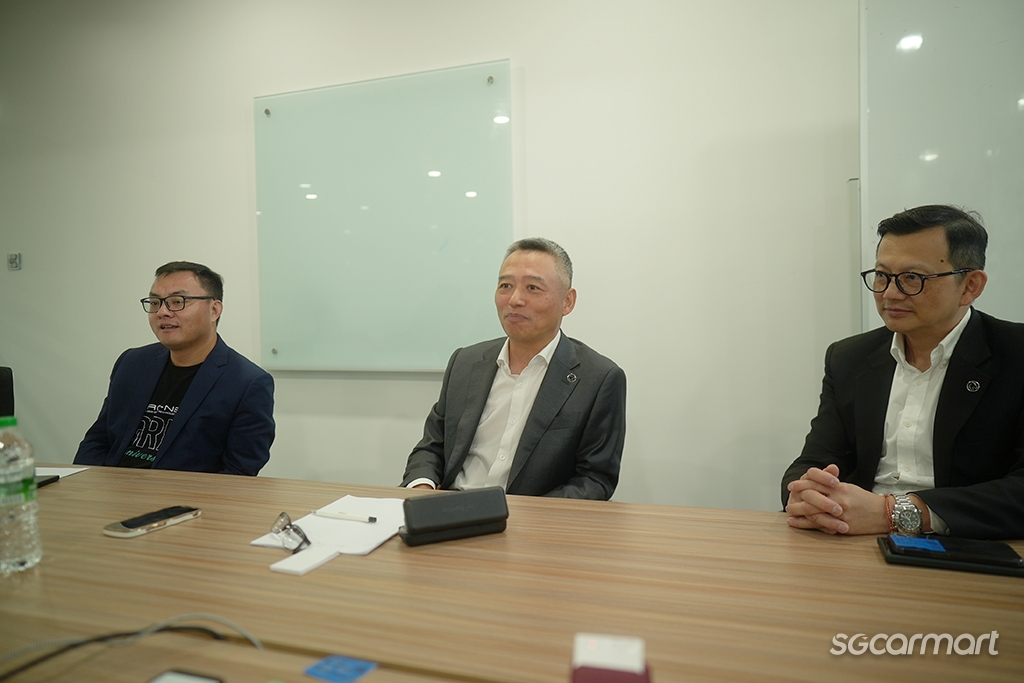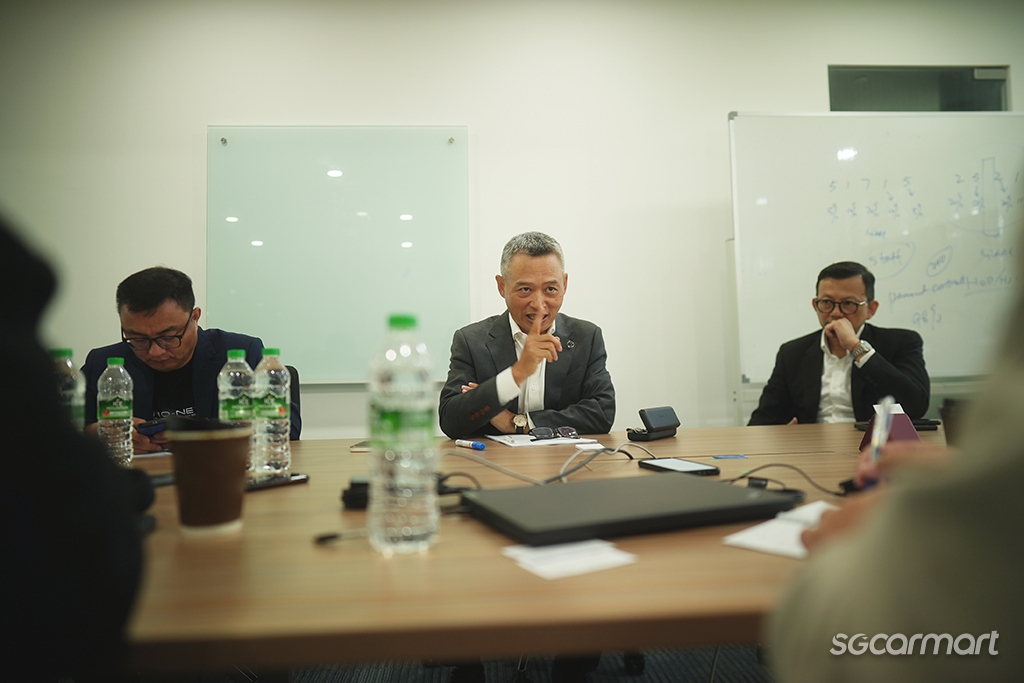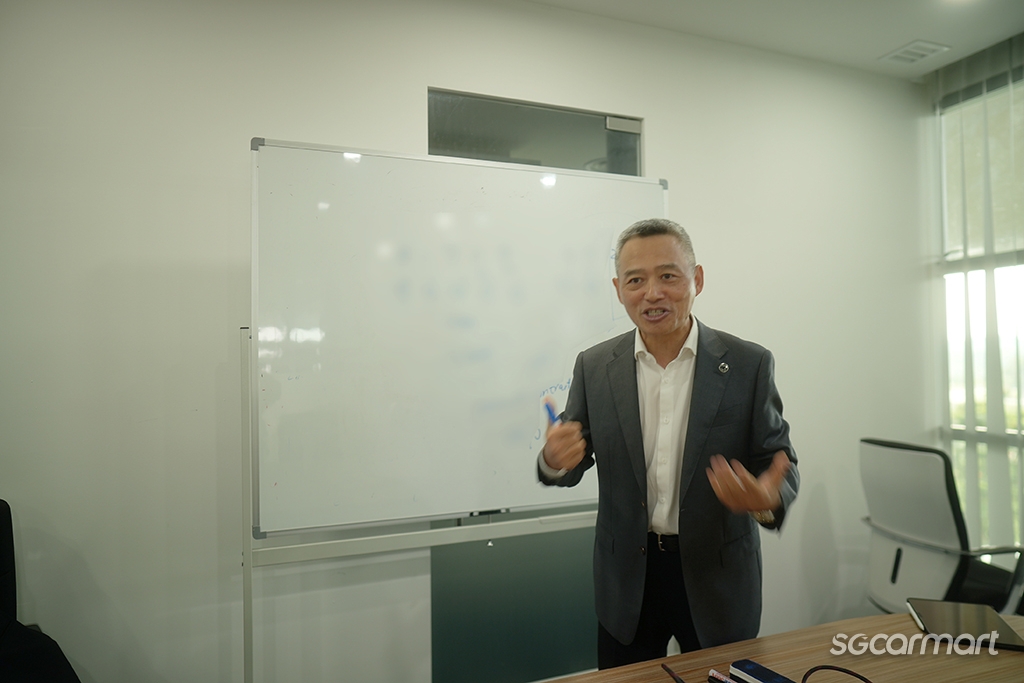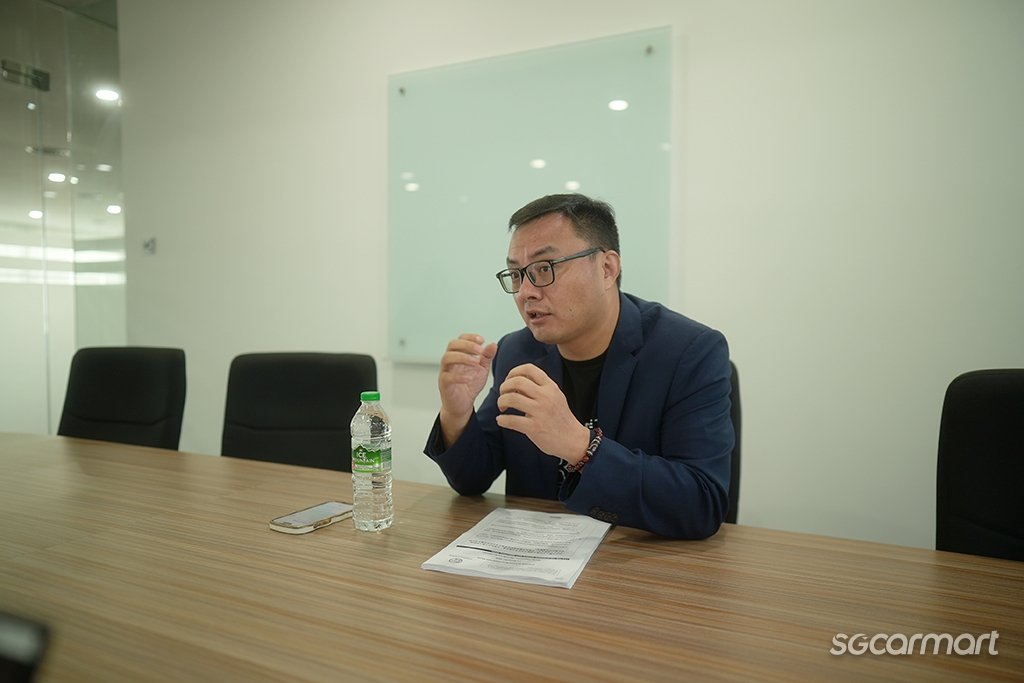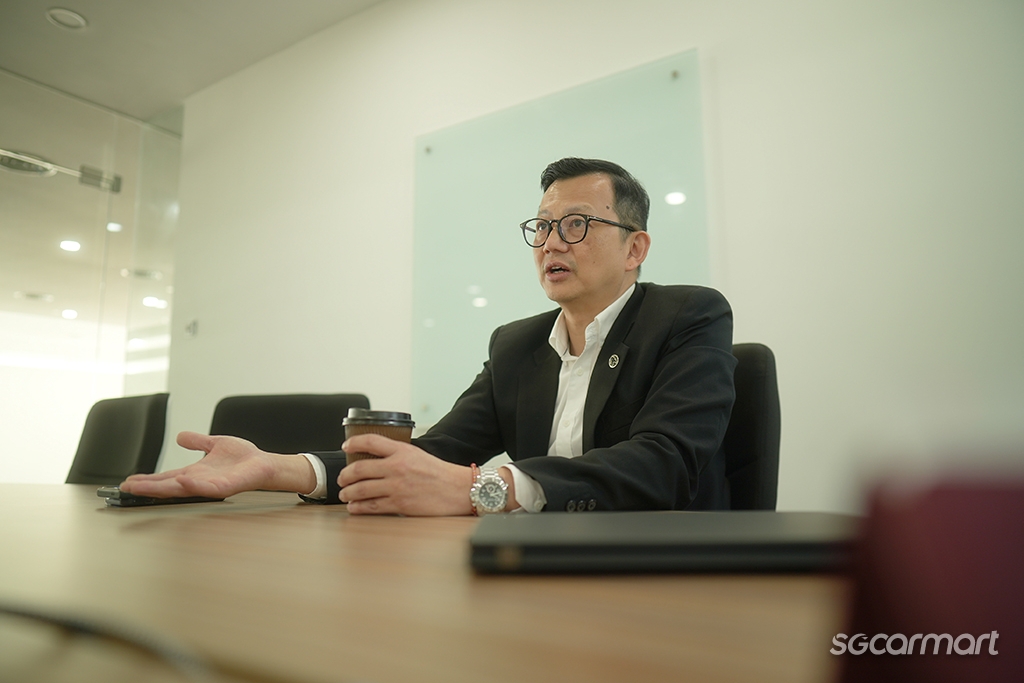Proton's big bet on Singapore with the e.MAS 7
03 Oct 2025|2,673 views
After a decade of absence, Proton is returning to Singapore, this time all-new and electrified with the Proton e.MAS 7. The last time Proton sold cars in Singapore (in 2014), it was already facing a competitive disadvantage: Its product lineup was lagging perceived technological, emissions, and regulatory standards, while its brand presence and market relevance had declined.
Since then, Singapore's emissions policies have tightened dramatically alongside concerted electric vehicle (EV) push, making Proton's return contingent on meeting higher benchmarks. Fast forward to today, Proton has set its sights on the Singapore market, together with distributor VINCAR, but the question remains: Why now, and what has really changed?
Then vs Now
Meeting Proton again feels like bumping into an old classmate at a reunion. You recognise them, but yet there is something undeniably different. The Proton today wears the same badge, but the product is now a collaborative effort born from Geely's 49.9% acquisition in Proton.
At the same time, in 2015, Singapore's car market was also a very different place from where it is today. EVs were a curiosity, COE premiums were already a headache (or so we thought), and green mobility was little more than a policy aspiration. Today, the government is pushing hard under the Green Plan 2030, and EV brands battle it out in a zero-sum COE game.
This time, Proton's re-entry is staked on the e.MAS 7, its first mass-market EV and a symbol of the brand's reinvention under Geely ownership. While known for mass-market budget petrol cars before, this new-faced EV is a far cry from its once bare-offering branding. While the collaborative effort of principal and distributors plan to keep prices in the low-frills range (think about $170k), the product is far from low-frills. From ventilated leather seats, panoramic sunroof, ADAS-fitted, wireless charging, a heads-up display, rear-reclining seats, the list goes on and on. Step into a modern day Proton and the contrast to its pre-Geely product is worlds apart.
With this new product, Proton aims to refresh its image in Singapore. The message is clear: If this new Proton can win back Singapore, it'll be ready for the world.
"Singapore is a developed market, and if we can get good performance in Singapore, I believe we can go on to more countries," said Dr Li Chunrong, CEO of Proton, during our conversation at Proton's Tanjung Malim plant.
The Turnaround Story
When Dr Li took over Proton in 2017 after Geely acquired 49.9% of the company, the brand was in free fall. Market share had collapsed in Malaysia, and competition from Perodua and Japanese marques was brutal.
"If I had known how tough it was going to be, maybe I would not have taken the job," he joked, before adding more seriously that the turnaround was necessary for Proton's survival.
In less than a decade, Proton clawed back domestic market share, rebuilt its lineup, and now, with the e.MAS 7, has claimed the title of Malaysia's best-selling EV within months of launch. For Dr Li, Singapore represents the next test. Dr Li hopes to replicate the e.MAS 7's success in Singapore.
"If we fail again, it will take another 100 years to come back," he said bluntly.
Singapore as Stepping Stone
The e.MAS 7 is only the beginning. A midsize electric SUV, it will lead Proton's new electrified portfolio into export markets. Zhang Qiang, CEO of Pronet, Proton's EV subsidiary, also confirmed that the smaller e.MAS 5 is in the pipeline, designed to compete directly in urban markets like Singapore where compact EVs are in demand.
Success here would demonstrate Proton's ability to compete in a sophisticated, highly competitive environment and serve as a springboard for wider ASEAN and global ambitions. Dr Li likened Proton's decade-long absence to time spent in school. "We went away as a student, but now we return as a graduate," he said. The message was clear: Proton wants to show that it has learned from its past mistakes.
The proximity of Singapore and Malaysia also offers a real operational edge, not just cultural familiarity. Edmund Lim, CEO of Proton International Corporation, underlined the cross-border support Singapore owners can tap on: "The warehouse, the parts warehouse is here… if you are short of anything in Singapore, actually you have access to the main [Tanjong Malim] warehouse. You can take spare parts here back to Singapore, [it can be settled] within two days."
Lim also added that for cross-border drives, Proton e.MAS owners will benefit from any emergency support needed from Proton's network of its 47 e.MAS dealers across Malaysia.
What Comes Next
Proton's return to Singapore is anchored on the e.MAS 7, but success will depend as much on execution as on the product itself. In that regard, the brand has partnered with Vincar, a distributor with a proven track record in launching and marketing EVs locally, including the recent barrage of launches from the Aion and GAC brands.
Although Vincar's multi-brand lineup could appear to overlap with Proton's own offerings, Proton instead recognised Vincar's strengths in its customer reach and after-sales expertise - and chose to see that as a foundation for partnership rather than competition.
Singapore represents both a market locally and a benchmark regionally. Strong sales here will serve as a springboard for Proton's broader regional ambitions.
After a decade of absence, Proton is returning to Singapore, this time all-new and electrified with the Proton e.MAS 7. The last time Proton sold cars in Singapore (in 2014), it was already facing a competitive disadvantage: Its product lineup was lagging perceived technological, emissions, and regulatory standards, while its brand presence and market relevance had declined.
Since then, Singapore's emissions policies have tightened dramatically alongside concerted electric vehicle (EV) push, making Proton's return contingent on meeting higher benchmarks. Fast forward to today, Proton has set its sights on the Singapore market, together with distributor VINCAR, but the question remains: Why now, and what has really changed?
Then vs Now
Meeting Proton again feels like bumping into an old classmate at a reunion. You recognise them, but yet there is something undeniably different. The Proton today wears the same badge, but the product is now a collaborative effort born from Geely's 49.9% acquisition in Proton.
At the same time, in 2015, Singapore's car market was also a very different place from where it is today. EVs were a curiosity, COE premiums were already a headache (or so we thought), and green mobility was little more than a policy aspiration. Today, the government is pushing hard under the Green Plan 2030, and EV brands battle it out in a zero-sum COE game.
This time, Proton's re-entry is staked on the e.MAS 7, its first mass-market EV and a symbol of the brand's reinvention under Geely ownership. While known for mass-market budget petrol cars before, this new-faced EV is a far cry from its once bare-offering branding. While the collaborative effort of principal and distributors plan to keep prices in the low-frills range (think about $170k), the product is far from low-frills. From ventilated leather seats, panoramic sunroof, ADAS-fitted, wireless charging, a heads-up display, rear-reclining seats, the list goes on and on. Step into a modern day Proton and the contrast to its pre-Geely product is worlds apart.
With this new product, Proton aims to refresh its image in Singapore. The message is clear: If this new Proton can win back Singapore, it'll be ready for the world.
"Singapore is a developed market, and if we can get good performance in Singapore, I believe we can go on to more countries," said Dr Li Chunrong, CEO of Proton, during our conversation at Proton's Tanjung Malim plant.
The Turnaround Story
When Dr Li took over Proton in 2017 after Geely acquired 49.9% of the company, the brand was in free fall. Market share had collapsed in Malaysia, and competition from Perodua and Japanese marques was brutal.
"If I had known how tough it was going to be, maybe I would not have taken the job," he joked, before adding more seriously that the turnaround was necessary for Proton's survival.
In less than a decade, Proton clawed back domestic market share, rebuilt its lineup, and now, with the e.MAS 7, has claimed the title of Malaysia's best-selling EV within months of launch. For Dr Li, Singapore represents the next test. Dr Li hopes to replicate the e.MAS 7's success in Singapore.
"If we fail again, it will take another 100 years to come back," he said bluntly.
Singapore as Stepping Stone
The e.MAS 7 is only the beginning. A midsize electric SUV, it will lead Proton's new electrified portfolio into export markets. Zhang Qiang, CEO of Pronet, Proton's EV subsidiary, also confirmed that the smaller e.MAS 5 is in the pipeline, designed to compete directly in urban markets like Singapore where compact EVs are in demand.
Success here would demonstrate Proton's ability to compete in a sophisticated, highly competitive environment and serve as a springboard for wider ASEAN and global ambitions. Dr Li likened Proton's decade-long absence to time spent in school. "We went away as a student, but now we return as a graduate," he said. The message was clear: Proton wants to show that it has learned from its past mistakes.
The proximity of Singapore and Malaysia also offers a real operational edge, not just cultural familiarity. Edmund Lim, CEO of Proton International Corporation, underlined the cross-border support Singapore owners can tap on: "The warehouse, the parts warehouse is here… if you are short of anything in Singapore, actually you have access to the main [Tanjong Malim] warehouse. You can take spare parts here back to Singapore, [it can be settled] within two days."
Lim also added that for cross-border drives, Proton e.MAS owners will benefit from any emergency support needed from Proton's network of its 47 e.MAS dealers across Malaysia.
What Comes Next
Proton's return to Singapore is anchored on the e.MAS 7, but success will depend as much on execution as on the product itself. In that regard, the brand has partnered with Vincar, a distributor with a proven track record in launching and marketing EVs locally, including the recent barrage of launches from the Aion and GAC brands.
Although Vincar's multi-brand lineup could appear to overlap with Proton's own offerings, Proton instead recognised Vincar's strengths in its customer reach and after-sales expertise - and chose to see that as a foundation for partnership rather than competition.
Singapore represents both a market locally and a benchmark regionally. Strong sales here will serve as a springboard for Proton's broader regional ambitions.
Thank You For Your Subscription.






